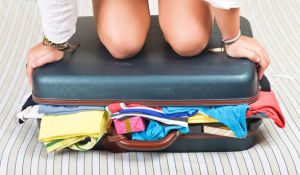Packing for Ecuador
How do you pack for weeks, months, or even a whole year abroad? It’s actually a lot easier than it feels. There are many resources out there to work with, but we’ve compiled some of our most helpful tips to keep your packing on your Ecuador efficient and effective for your time abroad!
Hear it from an Alumna, Elaina C., Semester in South Africa:
“When you start packing don’t STRESS. I know this is hard considering some of us were gone for a semester or even a year, but it is very simple and if you don’t bring enough clothes there are always cheap thrift stores or places local students can show you to pick up necessities.” – Elaina, Semester in South Africa
Plan ahead!
Familiarize yourself with your airline’s baggage allowance and fees.
Lay everything out BEFORE you start to put it in your luggage.
Toiletries
Unless you are going to a very remote location, you can replace just about all of your toiletries when you arrive to your destination. Save space (and weight) by just taking enough shampoo/conditioner/soap, etc. for the first few days. You can buy the larger quantities when you get there!
If you’re program is only a week or two, you should be able to make do with the travel-size stuff anyway.
Electrical appliances
Here’s the thing, if the current is different where you’re going than where you are coming from, it might be in your favor to get new appliances when you get there. Ecuador uses the same voltage as the USA (120v) so you will most likely not need a converter. Check on your electrical appliances to make sure that they are also 120v, if not you you may need to get a convertor. There is no need to get an adapter since Ecuador uses the same outlets as North America.
Medication
THIS IS IMPORTANT! If you take any prescription medications, take it with you and take enough to last you for the duration of your program. Please carry any prescription medications in the prescription bottle with the original label and not mixed into one bag or container! Make sure to bring the prescription with you as well.
Over-the-counter drugs you can probably get when you arrive, but if there’s anything you can’t live without, take it with you!
Clothes
Ready for the biggest secret of all time? This is the big one, the tip that all students yearn for: You need A LOT LESS than you think! Whether you are traveling for one month or three, you don’t need more than ONE bag! It’s called a laundromat, folks! And, let’s be honest, if you’re only traveling up to 2 weeks, you can make do with a carry-on!
Think about it, do you really wear EVERY item in your closet ALL the time? It’s more likely that you wear only a small portion of your closet, and rotate items about every 2-3 weeks. You only need to pack for 2-3 weeks, even if you’re going to be abroad a whole year! In Ecuador, we recommend that you pack for diverse climate.
Quito’s temperature stays fairly consistent throughout the year. The average daytime temperature is 60 °F and 50 °F during the night. The two distinct times of year in Quito are during the “wet” and “dry” seasons. The dry season (summer) runs from June to September while the rest of the year is considered “wet”.
Emergency contacts and passwords – that’s right, passwords…
- In your checked luggage, carry-on luggage AND wallet put a list of emergency contact names, phone numbers and email addresses. Put more than one on this list and more than one phone number – include a work number, home number, friend number, etc.. Make sure it is written down not just on a laptop, cellphone, tablet, etc. Although it is good to have an emergency contact on your cellphone, remember what happens when the battery dies…
- Include with the above a copy of your travel insurance contact phone numbers, policy and assistance details. Keep copies with your passport, hand luggage, checked luggage and with family back home.
- ALSO, this is more important than ever now. Before traveling abroad everyone should be sure to provide a list of their laptop, tablet, cellphone, or any other “technology” passwords in case of a serious life emergency. Additionally be sure to provide the same for Facebook, twitter, email, credit cards, etc… so that these can be appropriately accessed by family should some life emergency occur. Keep such listings secure but at the same time remember the need for 24-7 access. You can and should change these after you return home safely if you are worried about sharing your access.
Sample Packing List:
Essential Items – don’t forget these!
- Passport
- Copy of your passport to carry with you at all times
- University Identification Card
- Pepto-Bismol/Imodium, Advil, or other over-the-counter drugs, you know your body and what you may need!
- Prescription medications: Carry any prescription medications in the prescription bottle with the original label and not mixed into one bag or container!
- Personal journal
- Laptops/tablets, if necessary
If you bring any of these items with you, put them in your carry-on, NOT your checked bag:
- Camera
- Laptop/tablet, if you bring one – do not put these in your checked luggage!
- iPod or other music device, charger, and headphones
- We do not suggest bringing any valuable jewelry or items, but if you must, it is safer to carry them on rather than put them in your checked luggage.
- Keep in mind the TSA’s 3-1-1 rule for liquids in your carry on: 3.4 ounce (100ml) containers in 1 quart-sized, clear, plastic, zip-top bag; 1 zip-top, plastic bag per passenger placed in screening bin.


